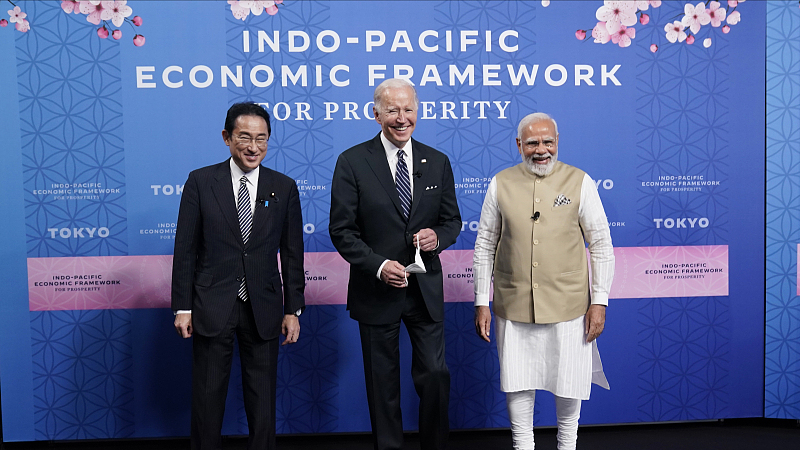
Japanese Prime Minister Fumio Kishida, left, U.S. President Joe Biden and Indian Prime Minister Narendra Modi pose for photos as they arrive at the Indo-Pacific Economic Framework for Prosperity launch event at the Izumi Garden Gallery in Tokyo, May 23, 2022. /CFP
Japanese Prime Minister Fumio Kishida, left, U.S. President Joe Biden and Indian Prime Minister Narendra Modi pose for photos as they arrive at the Indo-Pacific Economic Framework for Prosperity launch event at the Izumi Garden Gallery in Tokyo, May 23, 2022. /CFP
Editor's note: Thomas W. Pauken II is the author of "U.S. vs China: From Trade War to Reciprocal Deal," and a consultant on Asia-Pacific affairs and a geopolitical commentator. The article reflects the author's opinions and not necessarily the views of CGTN.
The U.S.-led Indo-Pacific Economic Framework (IPEF) was indirectly intended to contain the rise of China and to strengthen bilateral relations between Washington and Delhi. Nonetheless, the geopolitical strategy championed by U.S. President Joe Biden appears to have backfired.
Indian Prime Minister Narendra Modi has refrained from full participation with all of the framework's four pillars, which are trade, supply chains, clean energy and a fair economy. Accordingly, such unexpected circumstances could result in rising tensions between India and the U.S. India has yet to sign on to the framework's trade pillar but has accepted the other three.
Washington stands eager to remain the world's sole super power and fears China as a rival. The White House announced last May the establishment of the IPEF consisting of 14 countries, including a few member states of ASEAN (Association of Southeast Asian Nations), as well as Japan, South Korea, Australia and New Zealand.
At the time, Biden joined a QUAD Leaders' Summit in Tokyo, Japan, on May 23. The other leaders in attendance were PM Narendra Modi, Japanese PM Fumio Kishida, and Australian PM Anthony Albanese.
The Biden administration was hoping the QUAD, along with the IPEF, could weaken China's diplomatic influence and economic ties in the Asia-Pacific region. Washington was encouraging Delhi to take a tougher stance against Beijing while forging a stronger India-U.S. partnership.
Washington claimed that the IPEF could boost India's economy since the U.S. government boasted the framework as a grand opportunity for participating member states to increase cross-border trade and investment ties with the United States, the world's largest economy and importer. Many assumed India would have been very eager to join in, but that's not the case here.

Laborers carry items as the local wholesale business reopened amid easing COVID-19 restrictions in Delhi, India, June 9, 2021. /Xinhua
Laborers carry items as the local wholesale business reopened amid easing COVID-19 restrictions in Delhi, India, June 9, 2021. /Xinhua
India won't fall for deception
Delhi has concluded that the IPEF has not offered sufficient benefits for its member states, especially the developing countries, many of which hold prosperous and vibrant trade relations with China. Washington is cornering countries and forcing them to choose sides.
Accordingly, last week India walked away from the joint declaration on the trade pillar of the IPEF's first ministerial meeting in Los Angeles, with Union Commerce Minister Piyush Goyal expressing concerns over apparent discrimination against developing economies.
"We have to see what benefits member countries will derive and whether any conditionalities on aspects like the environment may discriminate against developing countries, who have the imperative to provide low cost and affordable energy to meet the needs of our growing economy," media reports quoted Goyal as saying at a press conference after the meeting.
Developing countries hold legitimate concerns since they wish to pursue rapid development by embarking on substantial industrialization, urbanization and modernization drives. But they are not as advanced as the developed nations, so it's more challenging for them to comply with the super high standards of environmental, labor, health and safety regulations.
For instance, the Indian minimum wage is significantly lower than in the U.S. and should they join the IPEF's trade pillar, Washington could impose punitive measures against Delhi over allegations of low wages.
Hence, major manufacturing firms from the U.S., Japan, Australia and South Korea could hold unfair advantages when setting up factories in India and other developing countries as they have large cash flows and can afford to pay higher labor wages.
This explains why the Indian government implements strong economic protectionists' regulations to support its Indian companies.
Despite such concerns, China-India bilateral trade continues to boom by reaching $125.6 billion in 2021, according to official customs data. It's the first year for two-way trade between both nations to surpass $100 billion in one year.
Washington refusing to bend
The Indian government has a sovereign right to enact its own laws and set an independent foreign policy. Should Delhi choose to enter into multi-party free trade agreements and economic frameworks, they have an obligation to negotiate for better benefits for its citizens and domestic companies.
China and India are enjoying good trade relations since they don't impose political mandates on each other and seek mutually beneficial economic cooperation. However, Washington won't take a similar approach with Delhi or other developing countries. The U.S. sees itself as a super power and demands unequal relationships. They won't accept India as their equal.
The IPEF is a Washington plot to curb China's rise, but it comes looking like a beautiful mask that touts a bold regional trade deal. Nevertheless, Delhi was not fooled by such trickery. India also discovered the IPEF's trade pillar was not a lovely gift for them as well. By unwrapping key details, it was uncovered that U.S.-based companies would have received preferential treatments.
Washington thought they could entice Delhi with the IPEF to turn the screws tighter on China but in reality, India stood firm as its government realized that its domestic companies would have been placed at much weaker positions.
Meanwhile, China-India bilateral relations have improved in recent months. It's doubtful Washington had anticipated that to happen when pushing forward on the IPEF.
(If you want to contribute and have specific expertise, please contact us at opinions@cgtn.com. Follow @thouse_opinions on Twitter to discover the latest commentaries in the CGTN Opinion Section.)

